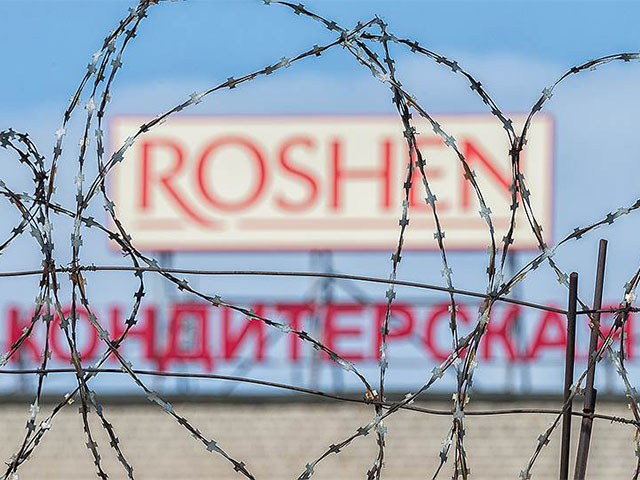
The recently elected president of Ukraine, Petro Poroshenko, is the hope and support of the Ukrainian national revolution. He is also a prominent figure in the food industry, known as a “Chocolate King”. Prior to being elected president, he owned and controlled Roshen, one of the largest producers of confectionary in Eastern Europe. Roshen was the leader among foreign suppliers of chocolate to Russia in 2013. But Roshen is losing its leadership because Russian authorities are now not in the mood to tolerate even a Ukrainian candy within their jurisdiction.
The recently elected president of Ukraine, Petro Poroshenko, is the hope and support of the Ukrainian national revolution. He is also a prominent figure in the food industry, known as a “Chocolate King”. Prior to being elected president, he owned and controlled Roshen, one of the largest producers of confectionary in Eastern Europe. Roshen was the leader among foreign suppliers of chocolate to Russia in 2013. But Roshen is losing its leadership because Russian authorities are now not in the mood to tolerate even a Ukrainian candy within their jurisdiction.
Roshen’s factories are located in Ukraine, Lithuania and Russia. In July 2013 Roshen chocolates produced outside of Russia were banned from Russia for alleged quality and safety violations, reportedly costing the Chocolate King millions of dollars. This ban came exactly when the president of Ukraine, Viktor Yanukovych, was favoring a trade deal with the European Union. The Russian government was angered at Yanukovych’s apparently west-leaning politics supported by majority of Ukrainians including Poroshenko.
 In order to continue selling chocolate in Russia during the import ban, Roshen accelerated the pace of increasing the production of its chocolate at its factory located in the Russian city of Lipetsk. Moreover Roshen sped up the construction of the new facility based in Russia. This could have been a good strategy for Roshen, but Russia seems determined to exclude Ukrainian candies from their market. United Confectioners Company (Uniconf) is a key competitor of Roshen in Russia and is controlled by the Moscow City government. In 2014 it initiated a criminal case against Roshen, accusing it of producing counterfeit goods.
In order to continue selling chocolate in Russia during the import ban, Roshen accelerated the pace of increasing the production of its chocolate at its factory located in the Russian city of Lipetsk. Moreover Roshen sped up the construction of the new facility based in Russia. This could have been a good strategy for Roshen, but Russia seems determined to exclude Ukrainian candies from their market. United Confectioners Company (Uniconf) is a key competitor of Roshen in Russia and is controlled by the Moscow City government. In 2014 it initiated a criminal case against Roshen, accusing it of producing counterfeit goods.
The criminal case is a continuation of a 2011 civil proceedings in which one of the Uniconf subsidiaries, the Moscow-based Rot Front candy factory, filed a lawsuit against Roshen, protecting its Lastochka candy trademark. As a result, the court ordered Roshen to pay 212 million rubles (US$6 million) to Rot Front. Roshen claims it stopped production of its Lastochka-Pevunya brand and is still fighting the decision in court, claiming the amount in controversy is inconsistent with the logic of the law and economics.
On March 14th, 2014 Russian authorities froze US$72 million of Roshen’s cash in Russian banks as per court decision in the newly initiated criminal case. Those funds were investments for future construction of a new Roshen factory in Russia.
On March 19th, 2014 the operation of the Roshen factory in Lipetsk was suspended and the entrance to the Roshen factory was blocked by a riot police truck. Workers were not allowed to enter the factory. “The work is stopped on our facilities in Lipetsk due to inspections made by the representatives of the Moscow Main Interior Department on grounds of the criminal case which we consider fabricated. In such conditions it is impossible to produce products”, – Inna Petrenko, Roshen’s spokeswoman, claimed.
Ukraine’s Foreign and Economic Development ministries then made a joint statement and urged Russia “not to link economic ties to the already complicated political situation”.
The document states that the Ukrainian authorities “guarantee and respect the rights of Russian investors in Ukraine, as well as of investors from other countries.” The statement continued, “We demand a similar attitude toward Ukrainian investors in Russia.” It urged the Russian authorities “to immediately stop interference in the production activity and provide an explanation of the Roshen premises seizure”.
With work stopped and the company’s accounts (with investors’ money) frozen, Ukraine has called the move “a dangerous precedent”, a possible prelude to the confiscation of Ukrainian businesses in Russia as punishment for pursuing closer ties with the West.





